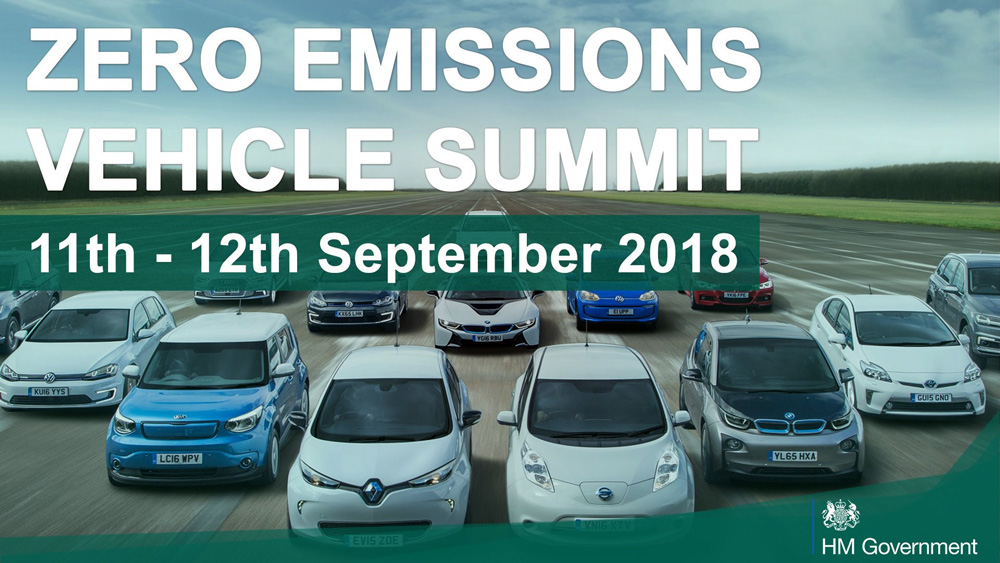World’s first Zero Emission Vehicle Summit
The UK held the world’s first Zero Emission Vehicle (ZEV) Summit on September 11-12, bringing together representatives from across the globe to support and collaborate on a zero-emission future for transport around the world.
Ministers, officials and business leaders from over 40 countries descended on Birmingham and Bedford for the two-day event, which sought to accelerate investment in both zero-emission technology and infrastructure.
The Prime Minister, Theresa May, told delegates at day one of the conference in Birmingham that she wants to see Britain “leading from the front and working with industries and countries around the world to spearhead change”.
And to help support that aim, the government has pledged £106 million for research and development in zero emission vehicles, new batteries and low carbon technology.
This will be bolstered by over £500 million worth of investment, creating over 1,000 jobs across the UK.
A total of 55 people spoke at the summit, including keynotes from companies such as Nissan, who emphasised the need to focus not only on the car but on the energy network too.
Commitments made as part of the landmark summit include:
- Signatories from 13 governments committing to a zero-emission future for transport, through action including consumer incentives, international collaboration, integration of zero-emission infrastructure into town planning and support for research and development;
- The first meeting of the Electric Vehicle Energy Taskforce – a group convening government with the energy and automotive industries – to plan for future electric vehicle uptake and ensure the energy system can meet future demand in an efficient and sustainable way;
- A Clean Van Commitment from 16 of the UK’s largest van fleet operators to have nearly 2,400 ZEV vans by 2020 and go completely zero emission in cities by 2028;
- A new £1 million fund from summit sponsors, Lex Autolease, to provide £1,000 off the first 1,000 pure electric vehicle orders from January 2019;
- Trials of new LEVC vans with London Fire Brigade and the Met Police;
- Plans for a new Degree Apprenticeship Centre at the University of Warwick which will focus on the high value manufacturing sector, backed by £10 million of government funding and with space for 1,000 students.
“No one nation can tackle the effects of climate change alone. But as a community of nations, taking global action, we can not only have a bigger impact but unlock huge shared economic opportunities. That’s why the UK hosted the world’s first Zero Emission Summit. We are working to create a platform for international co-operation and knowledge sharing on emissions issues, gathering together signatories from around the world to agree the Birmingham Declaration and, we hope, helping to create a cleaner, greener legacy for future generations,” Jesse Norman, Roads Minister said.
“As the global automotive industry goes through this transformative period, the leasing industry has a huge role to play. We have been working with customers for a number of years to help them upgrade to low emission vehicles – where it’s the right move for them as individual drivers or fleets. One of the key benefits of leasing an electric vehicle is that customers avoid any of the potential risk associated with its future resale value. With battery technology and range continuing to improve, electric vehicles are fast becoming suitable for mainstream motorists. With this in mind, we’re pleased to have announced our new £1 million fund to encourage wider take up of zero emission technology,” Tim Porter, Managing Director of Lex Autolease, the vehicle leasing arm of Lloyds Banking Group, commented.
The summit follows the Prime Minister’s ambition set out earlier this year to put the UK at the forefront of the design and manufacturing of zero emission vehicles, and for all new cars and vans to be effectively zero emission by 2040. The government’s Road to Zero Strategy published in July set out a clear pathway to zero emissions, to give clarity and certainty to both industry and motorists.
The work is all part of the government’s Future of Mobility Grand Challenge, outlined in its modern Industrial Strategy, aiming to help reduce greenhouse gas emissions, make travel safer, improve accessibility, and present enormous economic opportunities for the UK.
The summit was the next step in the mission to put the UK at the forefront of zero-emission technology saw industry stepping up to the challenge alongside the government.
www.gov.uk







